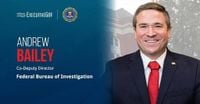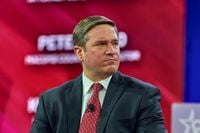Missouri’s outgoing Attorney General Andrew Bailey, a name that’s recently become synonymous with high-profile legal battles and conservative causes, is stepping into a new—and somewhat unusual—role at the Federal Bureau of Investigation. On Monday, August 18, 2025, Bailey announced he would leave his post as Missouri’s top legal officer to become co-deputy director of the FBI, sharing the post with current deputy director Dan Bongino. The move, welcomed by Trump administration officials but met with confusion among FBI insiders, marks a significant shift both for Bailey and for the bureau’s leadership structure.
Bailey’s appointment comes at a time when the FBI is under intense scrutiny and in the midst of internal shakeups. Attorney General Pam Bondi and FBI Director Kash Patel issued statements praising Bailey’s credentials, with Bondi calling him “a distinguished state attorney general and a decorated war veteran, bringing expertise and dedication to service.” She added, “His leadership and commitment to country will be a tremendous asset as we work together to advance President Trump’s mission,” according to Fox News Digital.
The co-deputy director arrangement is a departure from FBI tradition, raising eyebrows among agents and observers alike. As The New York Times reported, many at the bureau had never heard of such a position before. The move is widely interpreted as a sign of uncertainty for Bongino’s future at the FBI. Bongino, who has reportedly clashed with Bondi over the Justice Department’s handling of files related to the late Jeffrey Epstein, now finds himself sharing power with Bailey. Their working relationship will be closely watched, particularly after reports that Bongino threatened to resign during a heated exchange with Bondi in July 2025.
Bailey’s resume is a study in conservative legal activism. During his tenure as Missouri attorney general, he championed causes that aligned closely with former President Donald Trump’s agenda. He took on Starbucks over its diversity, equity, and inclusion (DEI) policies, sought to restrict gender-affirming care, and worked to uphold abortion restrictions in Missouri. He also publicly amplified claims that the 2020 presidential election was stolen, a stance that cemented his reputation among Trump loyalists.
Perhaps most controversially, Bailey demanded records about minors seeking abortions while serving as Missouri’s attorney general—a move that drew sharp criticism from reproductive rights advocates. In March 2024, he subpoenaed the Missouri Abortion Fund, a nonprofit that offers financial assistance for abortion care, demanding documents about minors and the group’s communications with Planned Parenthood Great Plains. Missouri law requires parental consent for anyone under 18 seeking an abortion, but the nonprofit’s lawyer, Elad Gross, called the subpoena “an abuse of government power” and a “fishing expedition,” according to the Missouri Independent. Gross argued in court filings that the attorney general’s actions violated the right to reproductive freedom. A judge agreed to temporarily block the subpoena in April 2024.
The subpoena was part of a broader lawsuit filed by Bailey’s office in February 2024, which accused Planned Parenthood Great Plains of “trafficking” minors across state lines for abortions without parental consent. The lawsuit was based on a video produced by Project Veritas—a far-right activist group known for undercover sting operations—purporting to show Planned Parenthood employees discussing abortion access for a 13-year-old without parental knowledge. Planned Parenthood dismissed the scenario as “fictitious,” arguing that the video was heavily edited and inaccurate. Despite their efforts to have the case thrown out, the court denied Planned Parenthood’s motions to dismiss, and the organization has since filed a counterclaim.
Bailey’s legal battles have not been limited to Missouri. In July 2025, he sued Planned Parenthood Federation of America, alleging that the organization spread misinformation about the safety of mifepristone, a drug used in medication abortions. This lawsuit is part of a larger national push by anti-abortion activists to cast doubt on the safety of abortion medications, especially in the wake of the Supreme Court’s 2022 decision overturning Roe v. Wade. A report circulated by the Ethics and Public Policy Center, a right-wing think tank, claimed that serious complications from mifepristone were 22 times higher than previously reported—a claim critics dismissed as “bogus.”
Bailey’s confrontations with Planned Parenthood echo efforts by the Trump administration to curtail the organization’s funding. In 2023, Trump’s “Big, Beautiful Bill” included a provision to strip Medicaid funds from nonprofits receiving more than $800,000 from Medicaid, a move that would have affected Planned Parenthood and several clinics in Maine. However, a federal judge ordered the government to continue reimbursing Planned Parenthood with Medicaid funds in July 2025, dealing a blow to those efforts.
Bailey’s new role at the FBI will see him working alongside Bongino, Bondi, and Director Patel, overseeing daily operations at the bureau. Neither Bailey nor Bongino has extensive experience within the FBI, a fact noted by Axios and others, adding to the intrigue surrounding the appointments. Bailey’s military service as an armored cavalry officer and his legal background—ranging from assistant prosecuting attorney in Warren County to general counsel for the Missouri Department of Corrections—are expected to inform his approach to the job.
Bailey expressed his gratitude in a statement, saying, “I am eternally grateful for the opportunity to serve as the Co-Deputy Director of the Federal Bureau of Investigation. I extend my deepest gratitude to President Trump and U.S. Attorney General Bondi for the privilege to join in their stated mission to Make America Safe Again.” Bongino, for his part, welcomed Bailey on X (formerly Twitter) with a brief post and three American flag emojis.
The timing of Bailey’s appointment coincides with a major expansion of the FBI’s presence in Missouri. On Wednesday, August 20, 2025, U.S. Senator Eric Schmitt and Director Patel announced “the largest per capita infusion of full-time agents and intelligence personnel in the nation” for the St. Louis area. While details remain sparse, both officials emphasized that the increased staffing is aimed at fighting violent crime and improving collaboration with local law enforcement. “This permanent investment in St. Louis by the FBI will be coupled with increased multilateral joint agency operations, increasing overall crime fighting capacity and building upon the important work being done on the state level to restore public safety,” Schmitt said. Patel added, “Investment in St. Louis is about action, not politics, making sure our agents are shoulder to shoulder with local law enforcement to take violent criminals off the streets.”
As Bailey prepares to step down as Missouri attorney general on September 8, 2025, he leaves behind a legacy of contentious legal fights and a reputation as a steadfast conservative. His arrival at the FBI’s upper ranks, alongside the ongoing expansion in St. Louis and the unresolved tensions with Bongino, signals a new chapter for the bureau—one that’s sure to be closely watched by supporters and critics alike. The coming months will reveal whether this unconventional leadership team can deliver on its promise to “Make America Safe Again,” or whether the internal divisions and political controversies will overshadow their mission.


